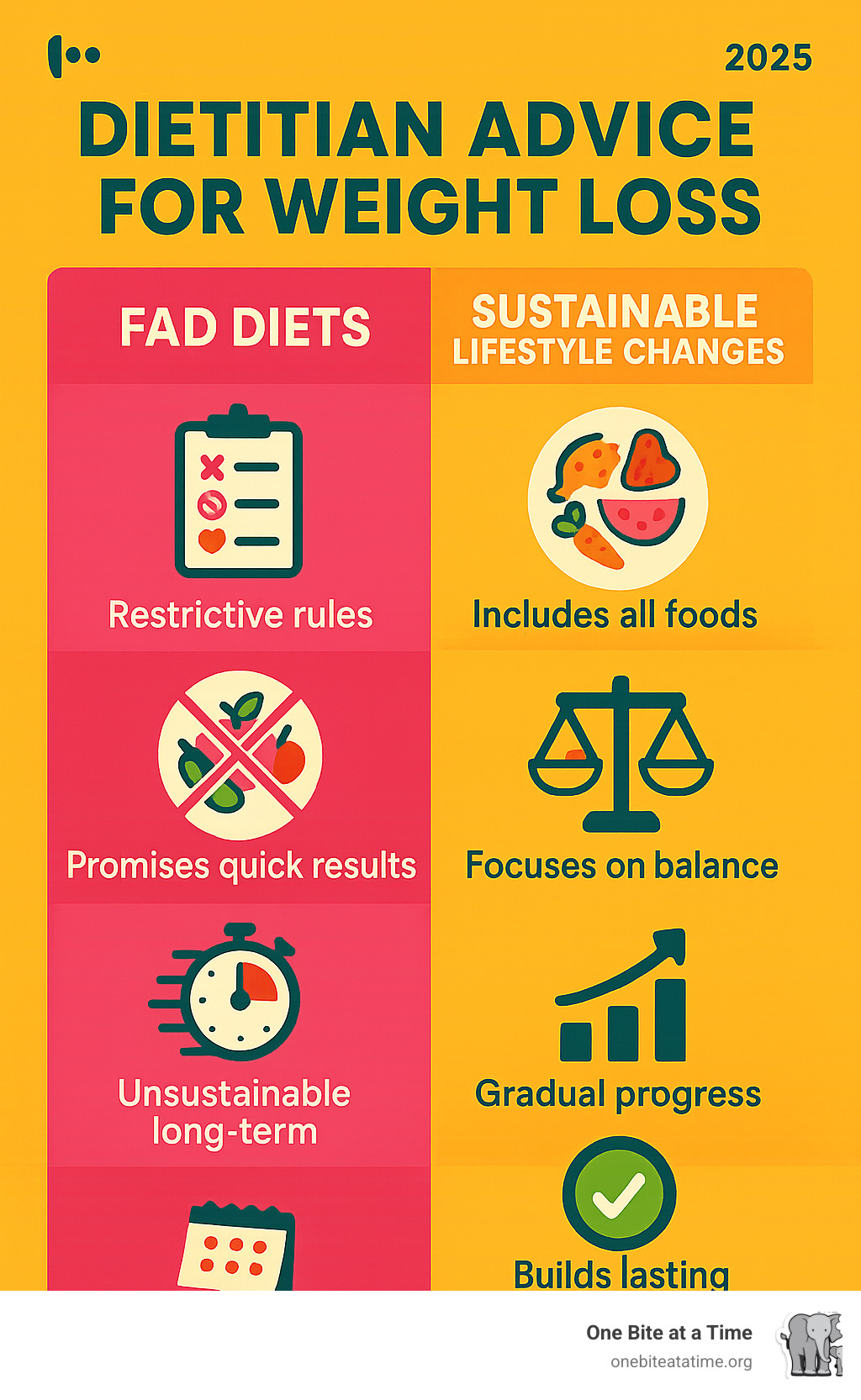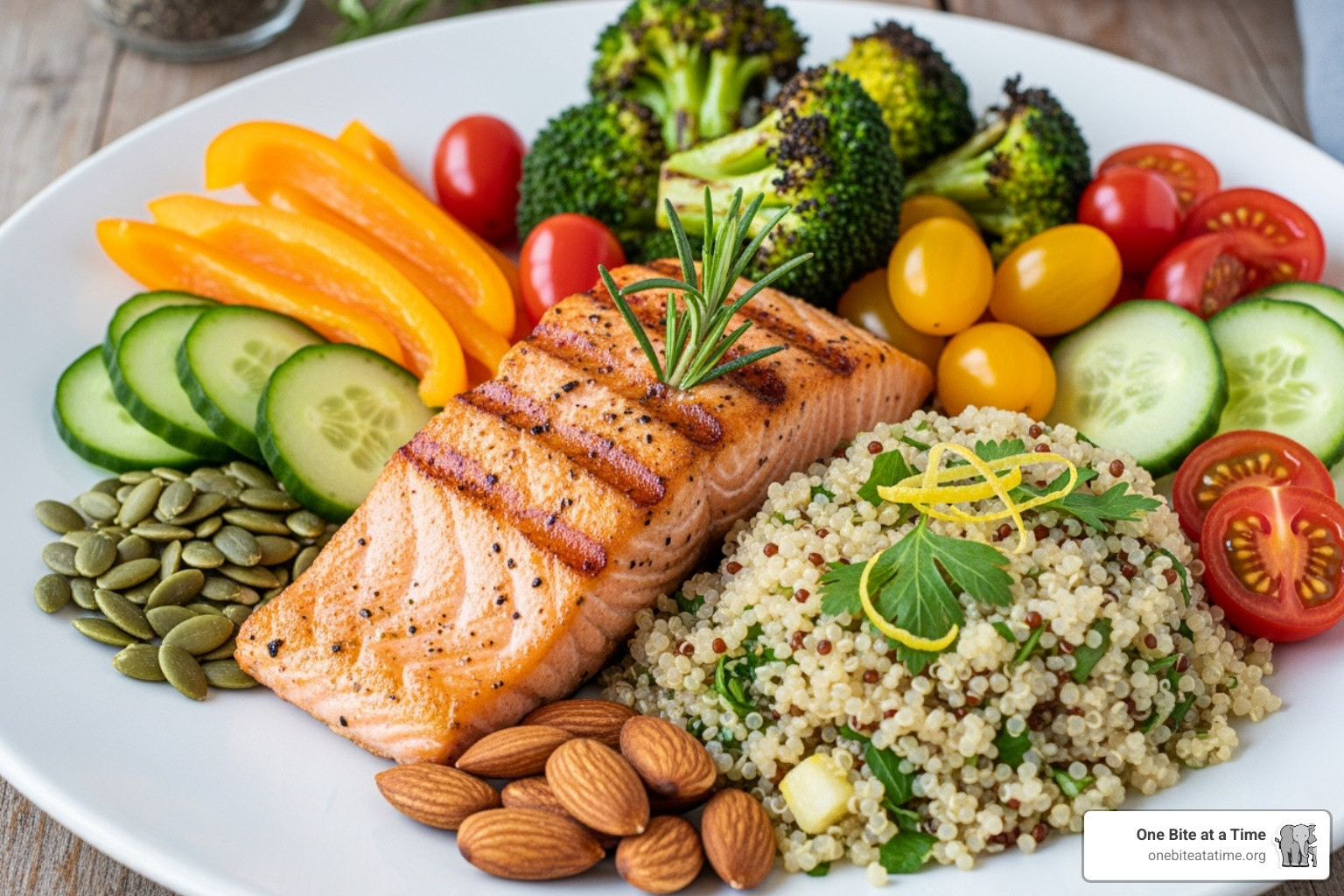Dietitian Advice for Weight Loss: 101 Proven Tips
Why Professional Dietitian Guidance Transforms Weight Loss Success
Dietitian advice for weight loss focuses on sustainable lifestyle changes rather than restrictive dieting, emphasizing evidence-based strategies that promote long-term health and well-being.
Quick Answer – Top Dietitian Weight Loss Recommendations:
- Aim for 1-2 pounds per week – slow, steady progress prevents muscle loss
- Focus on food quality over quantity – whole foods vs. processed options
- Include all food groups – balanced nutrition prevents deprivation
- Practice portion awareness – not strict measuring, but mindful eating
- Add regular physical activity – 150 minutes weekly of moderate exercise
- Track progress beyond the scale – energy levels, sleep, mood improvements
- Build sustainable habits – small changes that last a lifetime
If you’re exhausted from the endless cycle of restrictive diets and quick fixes that promise dramatic results, you’re not alone. More than 70 percent of Americans are overweight or obese, yet most weight loss attempts fail because they focus on short-term restrictions rather than sustainable change.
The difference between a registered dietitian’s approach and commercial diet plans lies in personalization and sustainability. While fad diets eliminate entire food groups or severely restrict calories, dietitians focus on Medical Nutrition Therapy (MNT) – a structured, evidence-based approach that considers your individual health needs, lifestyle, and preferences.
Research shows that losing just 5 percent of body weight can significantly reduce the risk of type 2 diabetes and heart disease. This means sustainable, modest changes often deliver better health outcomes than dramatic weight loss followed by regain.
The key insight? Weight loss isn’t about perfection – it’s about progress. Dietitians help you build a healthy relationship with food while creating lasting habits that support your overall well-being, not just a number on the scale.

The Foundations of Successful Weight Loss
Let’s be honest – stepping on the scale can feel like facing a judge who’s having a particularly cranky day. But here’s the thing: dietitian advice for weight loss isn’t really about that number staring back at you. It’s about creating a life where you feel energetic, confident, and genuinely healthy.

Think of weight loss like learning to play piano. You wouldn’t expect to master Beethoven in a week, right? Slow and steady progress – aiming for 0.5 to 2 pounds per week – gives your body and mind time to adjust. This approach isn’t just easier to maintain; it actually works better long-term than crash diets that leave you feeling deprived and eventually defeated.
Here’s something that might surprise you: losing just 5% of your body weight can dramatically improve your health. If you weigh 200 pounds, that’s only 10 pounds! This modest change can significantly reduce your risk of type 2 diabetes and heart disease. It’s not about reaching some “perfect” weight you saw in a magazine – it’s about feeling better in your own skin.
Scientific research on health benefits of modest weight loss
Rapid weight loss might seem tempting (who doesn’t want quick results?), but it often backfires. Your body can lose muscle mass, miss out on important nutrients, and your metabolism can slow down. Plus, those dramatic changes are nearly impossible to stick with. We’re here to help you find changes that feel natural and sustainable for life.
Why “Calories In vs. Calories Out” Is an Oversimplified Model
You’ve probably heard that weight loss is just about eating fewer calories than you burn. While there’s some truth to this, it’s like saying cooking is just about adding heat to food – technically correct, but missing so much of the story.
Your metabolism isn’t a simple calculator that never changes. As you lose weight, your body naturally needs fewer calories to function. It’s like downsizing from a big house to a smaller one – your heating bill goes down too. This is why weight loss often slows down over time, and it’s completely normal.
But here’s where it gets really interesting: food quality matters enormously. Imagine you have 200 calories to “spend.” You could choose a small bag of chips that leaves you wanting more in an hour, or you could have an apple with some nuts that keeps you satisfied until your next meal. Both have similar calories, but your body responds completely differently.
Processed foods are designed to be irresistible and easy to overeat, while whole foods naturally help you feel full and satisfied. When you focus on nourishing your body with quality ingredients, portion control often happens naturally.
More info about our Free Calorie Calculator
Research on how metabolism adapts to weight loss
Setting Realistic Goals Beyond the Scale
That scale in your bathroom? It’s just one tool, and honestly, not always the most helpful one. Some days it might show a higher number because you had extra sodium yesterday, you’re retaining water, or your muscles are recovering from a good workout. Talk about frustrating!
Instead, let’s focus on non-scale victories that actually reflect how you’re feeling and functioning. Maybe you notice you’re sleeping better and waking up refreshed. Perhaps you can climb stairs without getting winded, or your clothes are fitting more comfortably. These changes often happen before the scale budges, and they’re much more meaningful for your daily life.
Better lab results from your doctor – like improved blood pressure or cholesterol levels – are incredible victories worth celebrating. So is having steady energy throughout the day instead of that afternoon crash that used to hit you like a truck.
Improved mood and mental clarity are also powerful indicators that your new habits are working. When you’re nourishing your body well, your brain benefits too. You might find yourself feeling more positive, focused, and ready to tackle whatever comes your way.
Our approach focuses on sustainable habit formation – building small, achievable changes that add up to big results over time. We celebrate every step forward, no matter how small, because lasting change happens one bite at a time.
More info on developing a Nutrition for a Healthy Lifestyle
The Core of Dietitian Advice for Weight Loss: A Sustainable Approach
At One Bite at a Time, we believe that lasting weight loss isn’t about forcing yourself to eat tiny portions of sad salads. It’s about creating a way of eating that actually makes you feel good – both physically and mentally. This is where working with a registered dietitian makes all the difference.

Our approach is grounded in Medical Nutrition Therapy (MNT) – a fancy term for nutrition counseling that’s backed by science, not social media trends. Unlike generic diet plans that treat everyone the same, MNT considers your unique situation. We look at your health conditions, medications, food preferences, cultural background, and even your work schedule.
What works for your neighbor might not work for you, and that’s completely normal. A person managing diabetes needs different strategies than someone dealing with high blood pressure. Someone who travels frequently for work needs different meal planning than someone who eats at home most nights.
The beauty of dietitian advice for weight loss is that we help you avoid the common traps that derail most weight loss attempts. No more feeling guilty about eating a slice of birthday cake or panicking when you can’t find “approved” foods at a restaurant. Instead, we focus on building a healthy, relaxed relationship with food that you can maintain for life.
More info on our Weight Management Therapy
What is a dietitian’s advice for weight loss when it comes to food?
Here’s the thing about food and weight loss: it’s not about eating as little as possible or cutting out entire food groups. It’s about eating in a way that nourishes your body and keeps you satisfied.
Think of your plate as a colorful canvas. We encourage filling half of it with non-starchy vegetables – these are your best friends for weight loss. They’re packed with vitamins and fiber while being naturally low in calories. The other half gets divided between lean protein (about a quarter) and whole grain carbohydrates (the remaining quarter).
Portion awareness matters more than strict measuring. You don’t need to weigh your food forever, but learning what reasonable portions look like helps tremendously. Using smaller plates can naturally guide you toward appropriate portions, and eating slowly gives your brain time to register fullness – it takes about 20 minutes for that signal to kick in.
Choose whole grains over refined ones whenever possible. Brown rice, quinoa, and whole wheat bread provide more fiber and nutrients than their processed counterparts. This doesn’t mean you can never have white rice again – it just means making the nutritious choice most of the time.
Include protein with every meal to help you feel satisfied and maintain your muscle mass during weight loss. This could be chicken, fish, beans, eggs, or tofu – whatever fits your preferences and lifestyle.
Don’t fear healthy fats – your body needs them! Avocados, nuts, seeds, and olive oil are all great choices. Just remember that fats are calorie-dense, so a little goes a long way.
Stay hydrated throughout the day, especially before meals. Sometimes our bodies confuse thirst with hunger, leading us to eat when we actually just need water.
We also emphasize reducing processed foods, which often contain hidden sugars and unhealthy fats that can sabotage your efforts without you realizing it.
More info on Reducing Processed Foods
When you’re considering any weight loss approach, ask yourself these important questions: Does this plan teach me skills I can use forever? Is it based on solid science or just testimonials? Can I realistically follow this while living my normal life? Does it promise results that sound too good to be true?
Comparing Common Weight Loss Diets
Let’s be honest – every few months, there’s a new “revolutionary” diet making headlines. While some approaches can be helpful for certain people, understanding their pros and cons helps you make informed decisions.
Balanced eating approaches focus on including all food groups in reasonable portions. The pros? They’re sustainable, nutritionally complete, and teach you skills for life. The downside is that some people prefer more structure, especially when starting out.
Intermittent fasting can help some people by simplifying when they eat rather than what they eat. It may reduce overall calorie intake naturally and could have some metabolic benefits. However, it’s not suitable for everyone – particularly people with certain medical conditions or those with a history of disordered eating.
High protein diets can be effective for preserving muscle mass and increasing satiety during weight loss. The challenge is getting enough fiber and nutrients if you’re not careful about food choices, and some people find them hard to maintain long-term.
Low carb approaches often lead to quick initial weight loss and can help control blood sugar. But they can be socially challenging and may cause fatigue or digestive issues for some people. The key is finding a level of carb restriction that you can actually stick with.
Mediterranean-style eating emphasizes fruits, vegetables, whole grains, fish, and healthy fats. It’s well-researched for heart health and is generally easy to follow. The main consideration is that it may not provide the structure some people need for portion control.
The truth is, the best approach is the one you can follow consistently while feeling good physically and mentally. That’s exactly what we help you figure out during our counseling sessions.




